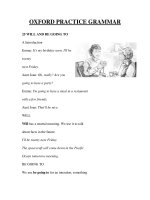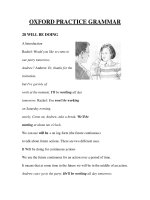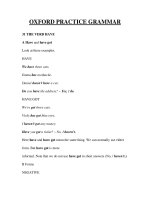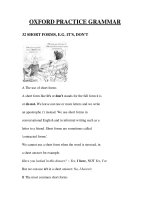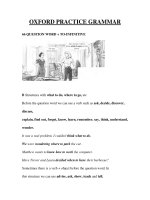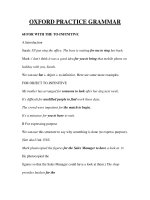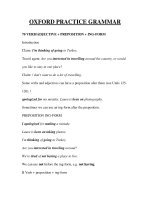Tài liệu OXFORD PRACTICE GRAMMAR 39 doc
Bạn đang xem bản rút gọn của tài liệu. Xem và tải ngay bản đầy đủ của tài liệu tại đây (127.35 KB, 5 trang )
OXFORD PRACTICE GRAMMAR
39 WHO, WHAT OR WHICH?
A What or which?
We can use what or which before a noun.
WHAT WHICH
What sport do you play? Which way do we go here?
What books do you read? Which finger did you break?
We use what when there is a wide choice of We use which when there is a
limited number of
possible answers. We ask What sport? because possible answers. We ask
Which way? because
there are lots of different sports. there are only two or three ways to go.
What sport? Which way?
(Tennis or golf or football or hockey or ... ?) (Right or left?)
After which we sometimes say the possible answers.
Which cafe did you go to, Snoopy's, the Coffee Pot or the Tea Gardens?
Which phone shall I use, this one or the one in the office?
Sometimes what and which are both possible.
What day/Which day is your evening class? What train/Which train will
you catch?
What platform/Which platform does the train go from? What part/Which
part of Italy are you from?
B Patterns with who, what and which
We can use who, what and which without a noun.
Who sent the fax? What do you think of our plan? Which is quicker, the bus
or the train?
We can use what and which before a noun, but not who.
Which secretary sent the fax? NOT Who-secretary-sent the-fax?
We can use which with one or ones, or with of.
You can have a photo. Which one would you like?
You can have some of the photos. Which ones would you like?
Which of these photos would you like? But
we cannot use who or what before of.
Which of the secretaries? but NOT Who-of the secretaries?
Who always means a person.
Who did you see? (a person) What usually means a thing. It can mean a
person only
when it comes before a noun.
What did you see? (a thing) What doctor/What film did you see? (a person
or a thing)
Which can mean a person or a thing.
Which doctor/film did you see? (a person or a thing)
102 One and ones
39 EXERCISES
1 What or which? (A)
The questions you are asking have a number of possible answers.
If the list of answers is incomplete, ask a question with what. If the list is
complete, use which.
? (Do you play the piano, or the violin, or the guitar, or ...?)
What musical instrument do you play ?
? (Did you go to the Little Theatre or the Theatre Royal?)
Which theatre did you go to ?
1 (Did you take the morning flight or the afternoon flight?)
2 (Did you stay at the Grand Hotel or the Bristol?)
3 (Do you like classical music, or jazz, or rock music, or ...?)
4 (Did you buy 'Time' magazine, or 'Newsweek', or a computer magazine, or
...?)
5 (Do you work for EuroChemicals, or ICM, or SenCo, or ...?)
6 (Are you learning English, or Spanish, or Arabic, or Japanese, or ...?)
2 What or which? (A)
Rita is moving into a new flat. Trevor has come to see the flat and help her
move in.
Complete his questions. Put in what or which. ► Trevor: What number is
this
building? Rita: Forty-two.
1 Trevor: I didn't realize there were only three floors…………….. .. floor is
your flat on?
Rita: The first floor.
2 Trevor: It's a very nice flat ..................... room will be your living-room?
Rita: This one here, I thought.
3 Trevor: ................... colour are you going to paint it?
Rita: Oh, I don't know yet.
4 Trevor: .................... time is your furniture arriving?
Rita: Three o'clock, they said.
5 Trevor: I'll need some petrol..................... way is the nearest petrol station?
Rita: Turn left at the end of the street.
3 Who, what or which? (B)
Detectives Wilson and Taylor are looking into the murder of Lord
Weybridge at his country house.
Put in who, what or which.
Wilson: (►) Which of the guests in this house is the murderer, do you think,
Taylor?
Taylor: I don't know yet. (1)……………….. had the opportunity?
(2)……………… of the guests had the
chance to do it?
Wilson: (3)……………….. happened after dinner last night? That's what we
have to find out.
Taylor: There must be a motive for the murder. (4)………………… motive
could the murderer have?
Wilson: Love or money - they're the usual motives. (5)………………… of
them is it, I wonder?
Taylor: (6)………………… did Lord Weybridge leave his money to? That's
the question, Wilson.

